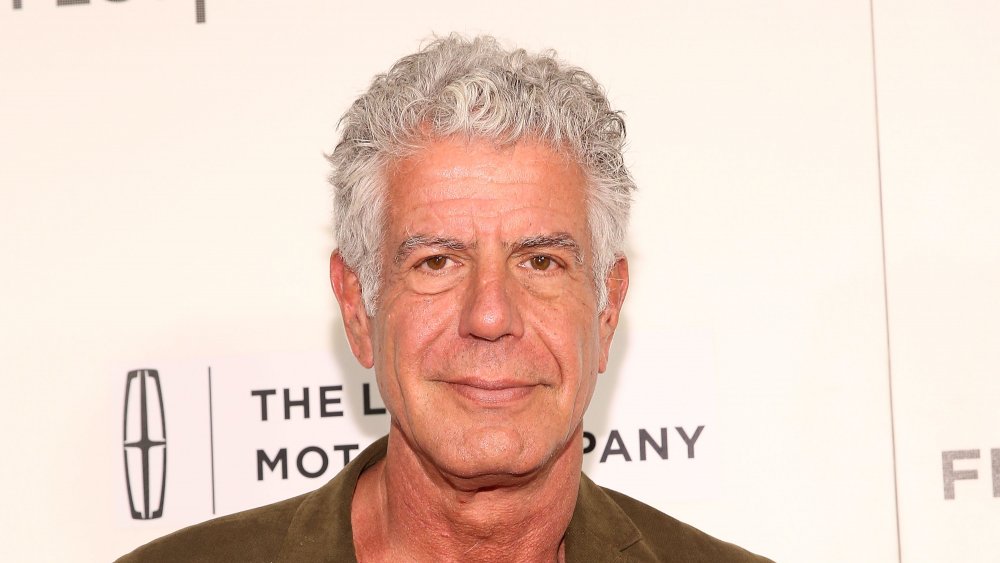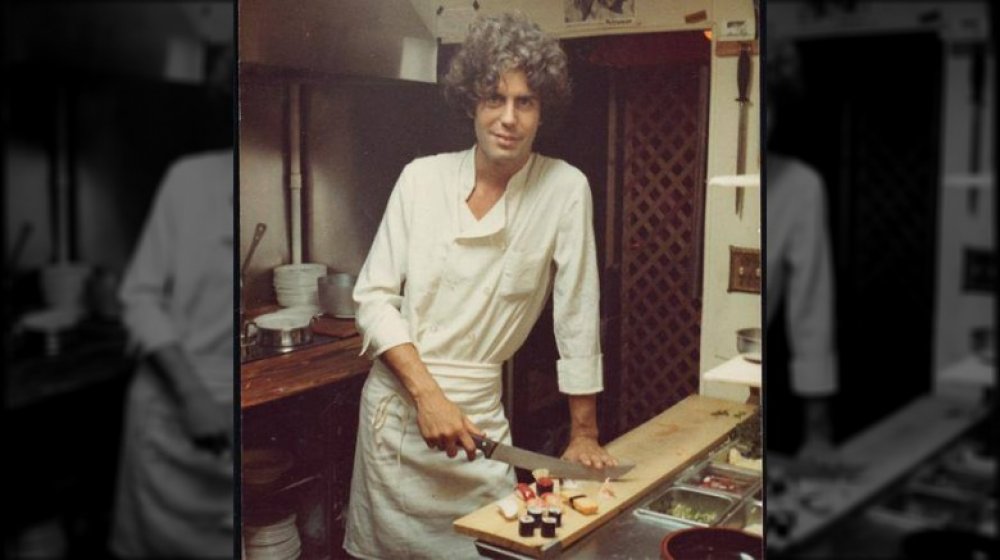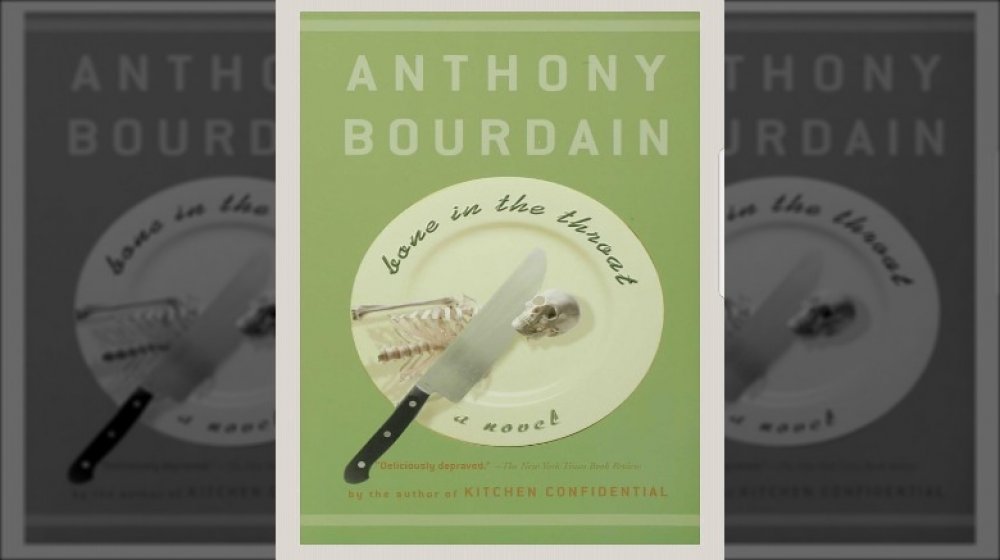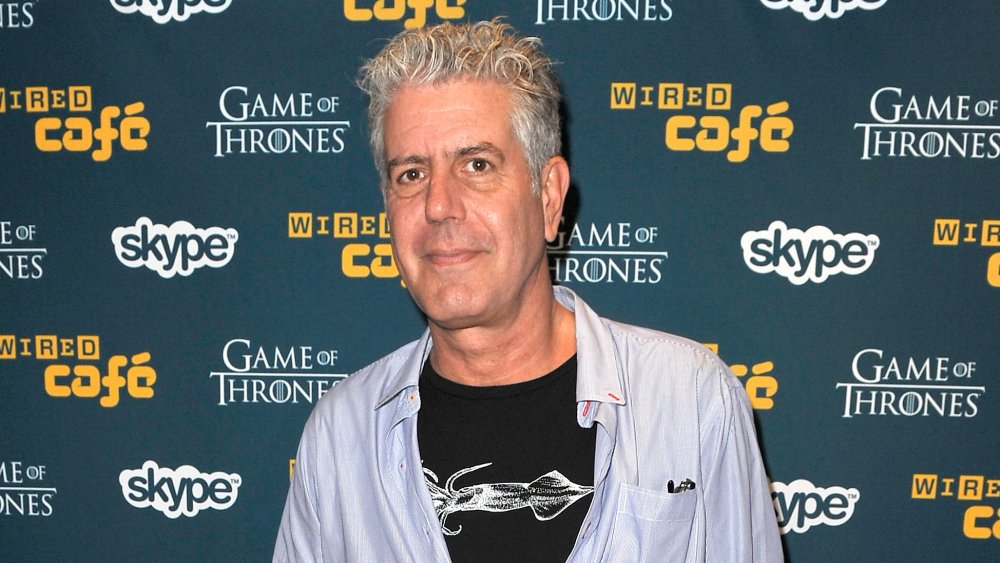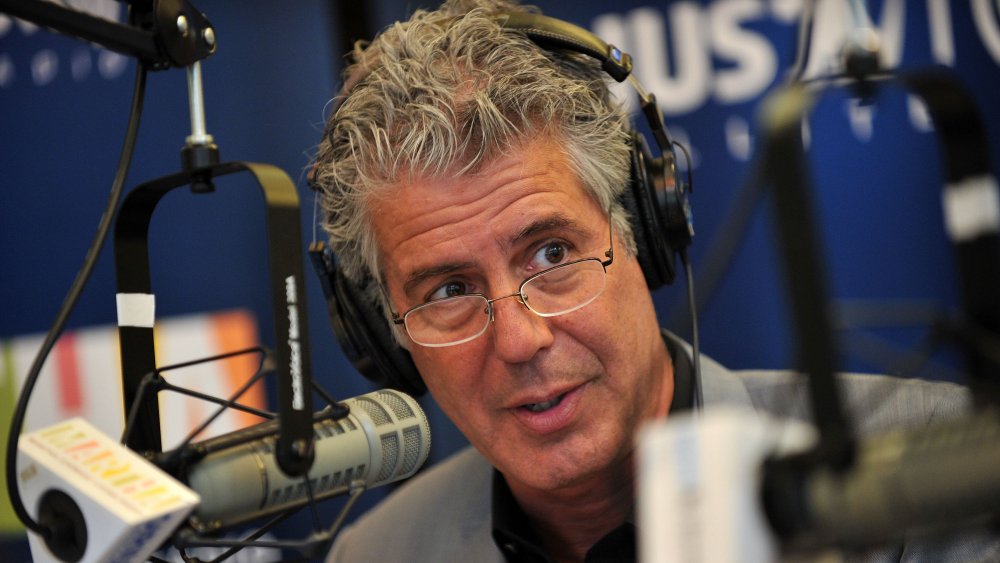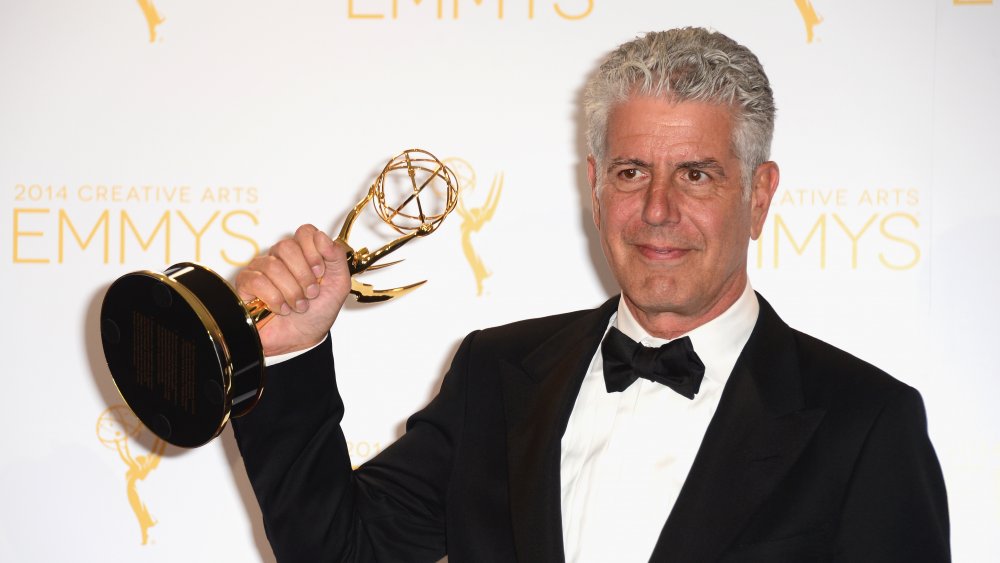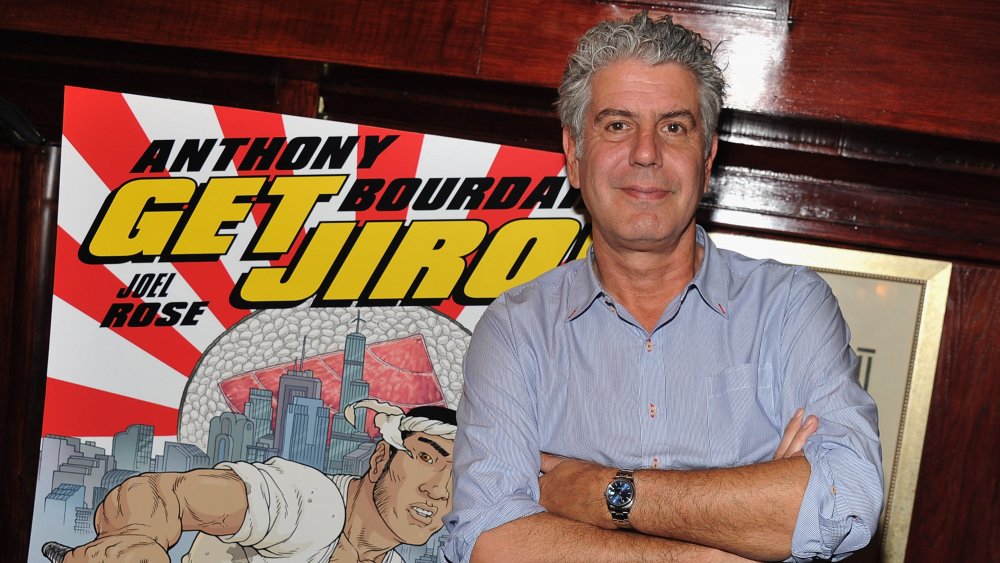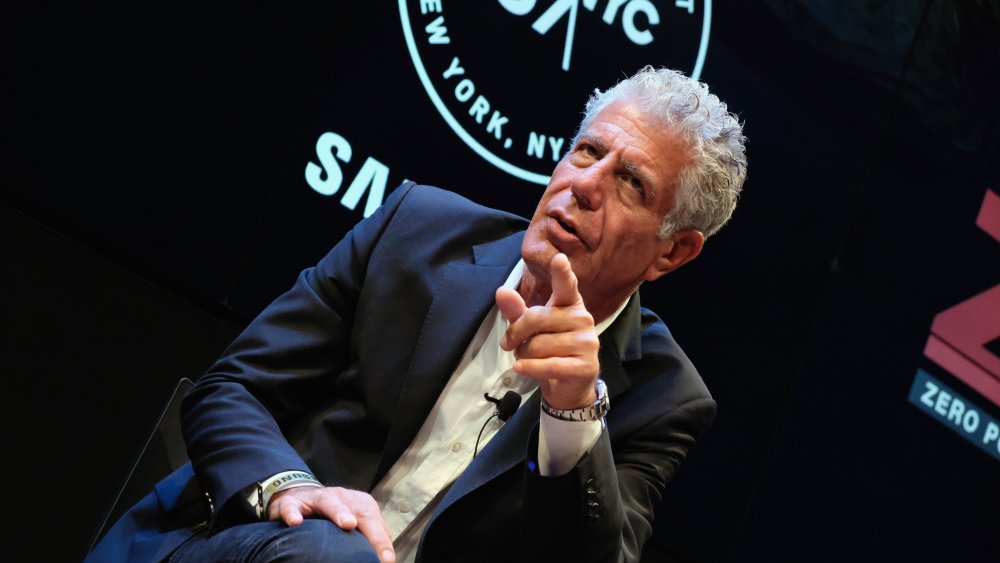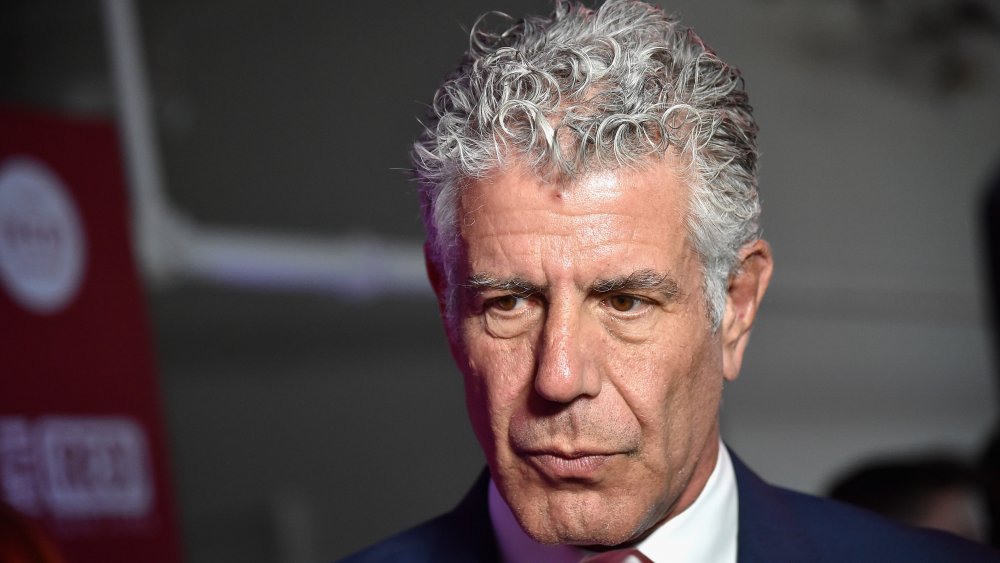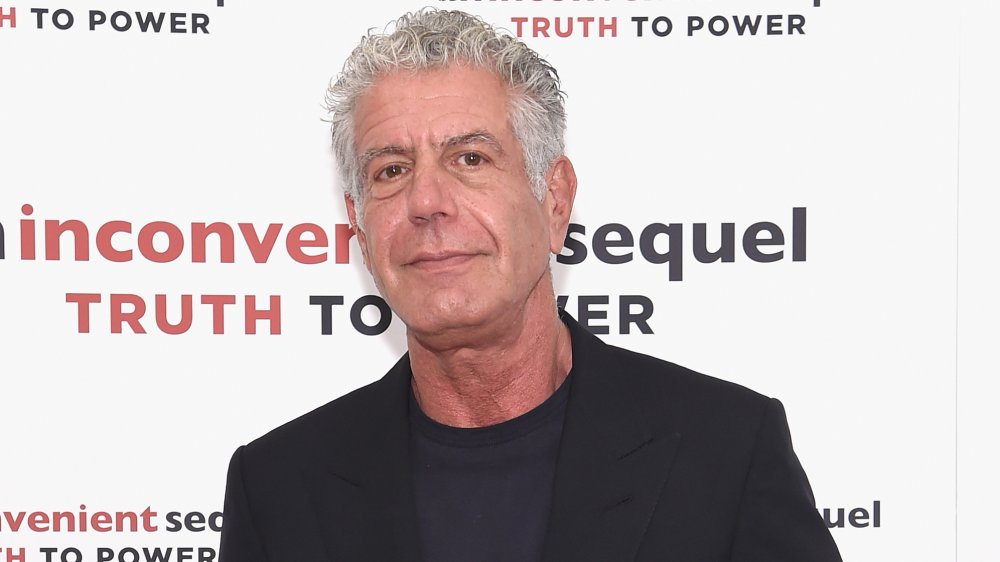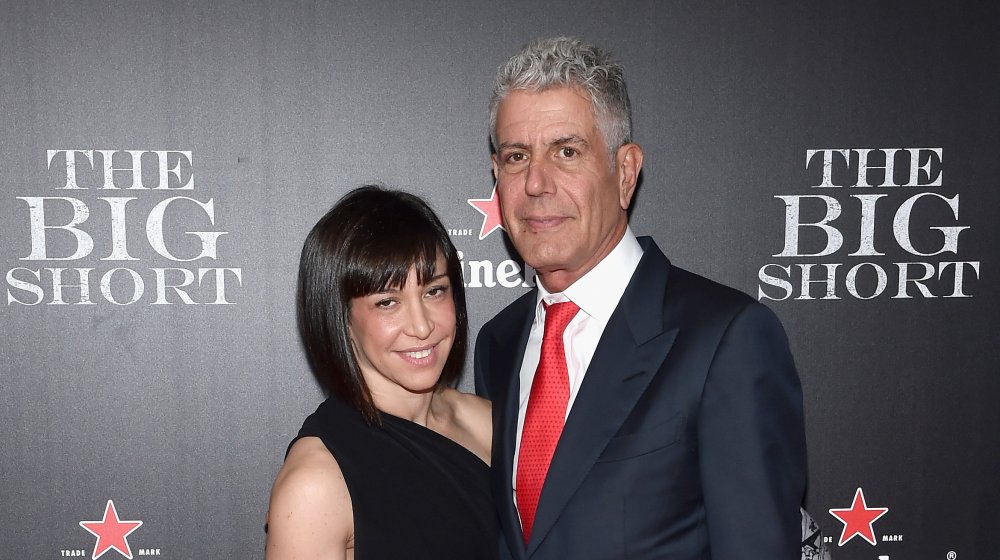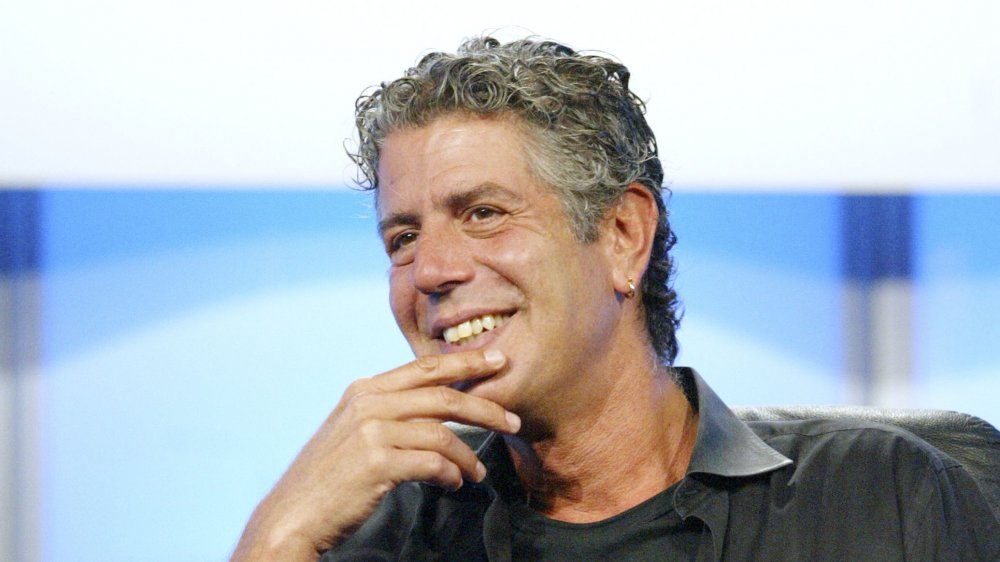This Is How Much Anthony Bourdain Was Really Worth
Anthony Bourdain is best known as the original bad boy of food television, making his mark on food culture with his sarcastic wit, lyrical prose, and brutally honest commentary. Striking the perfect balance of curmudgeon and nostalgic sentimentality, Bourdain was not only an influential chef and TV personality, but a writer, speaker, advocate, and household personality that would define the way we cook, eat, and travel.
At the time of his death in June 2018, Bourdain was still at the height of his fame, still in the midst of filming Parts Unknown. Many estimates circulated about his wealth, rumors going as high as in the tens of millions. However, throughout his life, Bourdain often maintained that estimates of his wealth were greatly exaggerated. "The reports of my net worth are about ten times overstated," he wrote for Wealthsimple. "I think the people who calculate these things assume that I live a lot more sensibly than I do.
Although he didn't live recklessly (at least not in the latter part of his life), he was not stingy with his money. Bourdain indulged in simple pleasures when he wanted to, refused to haggle, and poured his own money into causes he believed in — regardless of the financial returns. Of course, Bourdain's efforts and talents did not go unrewarded, and although his finances fluctuated dramatically from debt to millions, the story of how he made his money is as inspirational as it is delicious. This is how much Anthony Bourdain was really worth.
Anthony Bourdain struggled financially for years
Anthony Bourdain was born into a middle-class family. His father dropped out of Yale and worked at a printing company by day and a record store by night. His mother was a magazine and newspaper editor. Growing up, Bourdain said that his parents often spent more than they could afford, such as sending him to private school, making renovations on their home, or purchasing expensive cars (via Wealthsimple).
Bourdain himself worked nominally as a paperboy, dishwasher, and kitchen cook in his teens, but spent much of the money he earned on "loose joints" and movies. His parents managed to pay for two years of Vassar, but were relieved when he dropped out to go to the Culinary Institute of America instead. While attending school, he worked in New York City restaurants for $40 a shift, and made money on the side playing cards and selling drugs. After graduating in 1978, he made up to $120 a shift, then $800 a week at Les Halles as executive chef, but was still spending recklessly.
As reported by Eater, "Bourdain spent any spare funds on weed and the occasional trip to the Caribbean." He would often quit his jobs to take a vacation, then find a new job when he got back. Throughout his 20-year career as a chef, he would consistently owe money to bosses, the IRS, and American Express. Although he had found success in cooking and some writing, his lifestyle left him broke.
Anthony Bourdain made money through writing before fame
As the son of a writer, Bourdain also published while still working in kitchens, although his lifestyle meant that the small earnings he made from early books quickly disappeared. His first book was Bone in the Throat, published in 1995. It was a witty crime drama about a chef whose kitchen tangles with drugs, the FBI, and the mob (via Google Books). He was given a $10,000 advance, which he split with his old college roommate who had introduced him to book publishing. The book was later adapted into a movie in 2015 with guidance from Bourdain himself (via IMDB).
His second book, Gone Bamboo, was published two years later in 1997. It was yet another humorous thriller involving a married expat couple living in the Caribbean and working as hired assassins (via Good Reads). For this, Bourdain made about $8,000. However, he was still evading taxes and credit card payments. Neither of the books sold many copies. It wasn't until the publication of a New Yorker essay that his financial situation changed dramatically.
Published on April 19, 1999, Bourdain's New Yorker article "Don't Eat Before Reading This," became instantly popular. As reported by The Street, it "quickly put him on the map as a writer to watch." The essay revealed insider information about the on-goings of a professional kitchen and established Bourdain's signature style and voice, one of dark humor, effortless cadence, and raw honesty.
Kitchen Confidential cemented Anthony Bourdain's fame and success
After Bourdain's New Yorker piece was published, things moved quickly. A publisher offered Bourdain $50,000 to expand the essay into a book and within a year, he published Kitchen Confidential. Before this, he was still behind on rent and living without health insurance. Like the essay, Kitchen Confidential was an instant hit. According to Thrillist, the book was translated into over 20 languages and spent 44 weeks on the bestseller list. It also cemented Bourdain's stardom.
It was so popular, there was even a short-lived 2005 Fox sitcom based on the book. According to the Hollywood Reporter, the show starred a then-unknown Bradley Cooper, who played a fictionalized version of Bourdain, named "Jack Bourdain." The show ended after three episodes, and both Cooper and Bourdain went on to greater successes.
With the book's financial and cultural success, Bourdain was initially hesitant to leave the kitchen. He wanted to keep his job as a chef for as long as possible, but eventually realized life was sending him in a different direction. "There was this weird moment where I noticed that everyone in the dining room were journalists waiting to talk to me," Bourdain wrote for Wealthsimple. "I realized I'd become the sort of chef I used to despise, constantly having to leave the kitchen to deal with journalists. I didn't want to be that guy. So I left."
Anthony Bourdain escaped debt and became a full time writer and TV personality
After leaving the kitchen, everything changed for Bourdain. He became very careful about the decisions he made, financially or otherwise. For the first time in his life, he was able to start saving money. He finally got health insurance and opened his first savings account at 44-years-old (via Go Banking Rates). He quickly paid off his debts to the IRS and American Express, and vowed to never owe money again. Other than a mortgage, this would remain true for the rest of his life.
After the success of Kitchen Confidential, Bourdain published A Cook's Tour: Global Adventures in Extreme Cuisines in 2001. The book was published alongside a television show of the same name. The show debuted in 2002 and ran for two seasons (via Biography). A Cook's Tour featured Bourdain doing what he did best, traveling the world with a chef's perspective — but more importantly, his own distinctive Bourdainian perspective. It was the beginning of a new, Bourdain-inspired genre of television. Food and travel together, highlighting the cultures and cuisines that so often had been overlooked by mainstream media.
A Cook's Tour was followed by No Reservations in 2005, which then ran for nine seasons. According to CNN, Bourdain's intimate storytelling and nuanced understanding of food and culture won the show two Emmy Awards and dozens of nominations. In 2013, Bourdain returned to TV in Anthony Bourdain: Parts Unknown with CNN, winning four Emmy Awards.
TV made Anthony Bourdain money, but it's unclear how much
In addition to his most well-known shows, Anthony Bourdain also appeared as a guest in many other shows. During his time shooting No Reservations, he created an offshoot with the Travel Channel called The Layover, which featured the short, impromptu adventures Bourdain took between official destinations.
He also appeared on Top Chef, Miami Ink, Far Cry, and even Nickelodeon's Yo Gabba Gabba!. In addition to working as a writer and consultant for HBO's Treme, Bourdainprovided narration for PBS's Mind of a Chef — a passing of the proverbial food torch to a new generation of TV chefs (via Biography). As reported by Newsweek, one of his final projects was Wasted! The Story of Food Waste, a documentary about food waste in the United States.
However, it was unclear how much Anthony Bourdain was paid for each of his shows or for his various collaborations across the years. All that is known for certain, is that at the time of his death, Bourdain had a total of $425,000 in cash and savings (via Town & Country), much lower than previously estimated. He also noted in his Wealthsimple story that quality was always more important to him than payment, saying that those who worked on his TV shows "could get paid a lot more money, making a less good show for somebody else." He always chose art over a paycheck.
Anthony Bourdain also had his own publishing imprint
Anthony Bourdain also had his own publishing imprint part of Ecco Press, and although a company, it acted more as a passion project. Bourdain wrote that it "makes almost no money for me, but it's deeply satisfying" (via Wealthsimple). He used it as an opportunity to champion voices he believed in.
For his own books, which in addition to his early fiction, Kitchen Confidential, and A Cook's Tour also include Anthony Bourdain's Les Halles Cookbook: Strategies, Recipes, and Techniques of Classic Bistro Cooking, which came out in 2006. This was followed by The Nasty Bits in 2010. Then in 2010 came Medium Raw: A Bloody Valentine to the World of Food and the People Who Cook. Appetites, an ode to fatherhood, came out in 2016. He also dabbled in graphic novels with Get Jiro! in 2013 and Hungry Ghosts in 2018 (via Delish). Although Bourdain's later books were commercial successes, they weren't directly the reason behind his wealth.
"My books do very well, but it's probably the least profitable thing that I do," says Bourdain. "I like writing. But writing your way to riches isn't a reasonable life plan." He explains that it was actually the book tours that made him money. While they began at bookstores, they soon outgrew the venue space. Although it varied by the venue, a Bourdain book talk could cost upwards of $100,000 (via SpeakInk).
Anthony Bourdain made small investments
In addition to his moderate savings of $425,000 Bourdain also made a few investments. According to Bravo, at the time of his death, Bourdain had some $35,000 in brokerage money. This doesn't sound like a lot by most celebrity standards, but this is largely a reflection of his philosophy towards money in general. "Money doesn't particularly excite or thrill me," said Bourdain. "To me, money is freedom from insecurity, freedom to move, time if you choose to make use of time. My investments advisor understands that I'm not looking to score big on the stock market or bonds. I have zero understanding of it and zero interest" (Wealthsimple).
If his child and her mother were taken care of, that was all Bourdain was really concerned about. As for himself, as long as he had the funds to move and act freely, he was happy. He wasn't concerned with amassing wealth as much as he was with staying out of debt and enjoying his life on his terms and working with people and projects he enjoyed and believed in.
That being said, he did make some investments he felt were aligned with his philosophies. According to Inc, he invested in writing, such as Roads & Kingdoms, a magazine for long-form food and travel stories. He also invested in his publishing imprint. Similar to his publishing philosophy, his investments were more about encouraging his interests rather than making as much money as possible.
Anthony Bourdain owned property, but didn't love it
One of Anthony Bourdain's most important financial philosophies was to never again owe money to anyone, whether that was a person, credit card company, or the government. It's therefore, no surprise that he was unhappy about the mortgage he owned for the condo he bought for his ex-wife Ottavia Busia-Bourdain and their daughter Ariane. "I have a mortgage, but I despise the idea," Bourdain said, "That was my biggest objection to buying property, though I wasn't in the position to pay cash" (via Wealthsimple).
According to Insider, the home was worth $3.35 million when purchased in 2014, and although it wasn't included in the will, there was a $1 million mortgage liability which likely refers to it. The home is fit for a chef, including a Sub-zero fridge and six-burner, two oven cooking range.
But Bourdain was unhappy being an indebted homeowner and ended up regretting the purchase, saying he much preferred to rent. However, the move did ensure that his daughter and wife would be taken care of after his death, which was something Bourdain believed in strongly. As reported in USA Today, at the time of his passing, Bourdain was worth a total of $250,000 in personal property. This is more than he had in investments, but less than he had in his personal savings. After his death, the Upper East Side condo was put up on the market for $3.7 million dollars (via CNBC).
Anthony Bourdain he made most of his money from royalties
That brings us to how Anthony Bourdain really made most of his money. If it wasn't from the TV shows, the books, the properties, or the investments, what made up the majority of his wealth? In a way, it was not one thing, but all those things combined. The majority of Bourdain's wealth was from royalties. Royalties are usually associated with musicians, and they refer to payment for the continued use of a creative asset. In Anthony Bourdain's case, this extended to both his television appearances and his books. At the time of his death, Anthony Bourdain was worth $500,000 in "intangibles such as royalties and residuals from his TV work and books" (via USA Today).
This brings Bourdain's total net worth to $1.2 million dollars: $500,000 in royalties, $250,000 in property, $35,000 in investments, and $425,000 in savings. However, before his will was revealed, an initial estimate from Celebrity Net Worth put his net worth much higher, at $16 million. Showbiz Cheatsheet argues that the discrepancy is due to a trust Bourdain created in 2016, which they believe holds the majority of his wealth. Since the worth of that trust is unknown, there is no way to confirm Bourdain's wealth over $1.2 million. Celebrity Net Worth also defended their initial estimate, saying that wealthy people often create trusts for the tax advantages and to protect their loved ones' privacy.
The trust fund is for Anthony Bourdain's daughter, Ariane
The trust Anthony Bourdain left behind will go to his daughter, Ariane Busia-Bourdain, who is currently 13 years old. She is the primary beneficiary. The contents of the trust are confidential, but it is thought to include even more royalties, including image rights and future income. However, she will not receive these assets until she is 25-years-old, and then again at age 30. At 35, she will gain full access (via USA Today). As reported by Variety, since Ariane is still a minor, the court will mandate a guardian to hold her assets until she comes of age. The will also stated that in the case Bourdain survived Ariane, the inheritance would have transferred to her nanny, Myra Quizon.
As for Bourdain's ex-wife, Ottavia Busia-Bourdain, she became the executor of his estate and received his personal items and frequent flier miles (via CBS News). Many of these items were put up to auction to raise money for the Culinary Institute of America's Anthony Bourdain Legacy Scholarship. Food & Wine reported that the auction raised $1,846,575. The highest bids were for a Bob Kramer chef's knife, which sold for $231,250 and for Bourdain's personal U.S. Navy jacket, which sold for $171,150.
Anthony Bourdain cannot be measured in dollars
By our estimates, the cost of his home (after subtracting his mortgage), would have been about $2.7 million. Combined with the assets in his will of $1.2 million and the $1.8 million of his belongings, this comes to around $5.7 million. However, Bourdain's true net worth is likely much higher because of the contents of Ariane's trust, possibly as high as or even greater than the previously estimated $16 million. However, what Anthony Bourdain was really worth can hardly be measured in dollars.
As she wrote in the New Yorker, Anthony Bourdain's friend and fellow food personality Helen Rosner believed that he "was the best-known celebrity in America." He was certainly one of the best-loved, by chefs, cooks, foodies, writers, readers, and TV fans alike. His intimate take on food and culture brought us all closer together, despite being in the far corners of the world. As Rosner writes, "Bourdain felt like your brother, your rad uncle, your impossibly cool dad — your realest, smartest friend..." Whatever he was to us, we felt close to him, in the way that only a true writer can create. That's worth more than millions.
